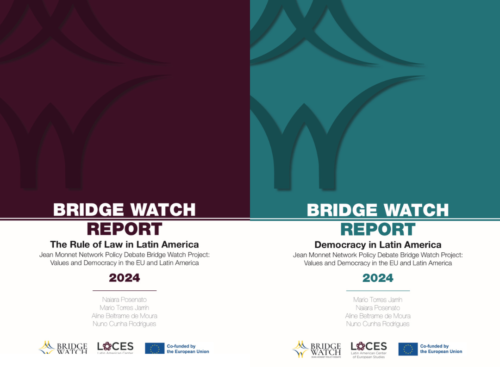
The BRIDGE Watch, a project of the Jean Monnet Network Policy Debates, has just published two key reports analyzing democratic governance in Latin America. With the participation of 64 experts, the studies address critical issues related to the Rule of Law and Democracy, providing a detailed overview of the challenges and progress in ten Latin American countries: Argentina, Bolivia, Brazil, Chile, Colombia, Ecuador, Mexico, Paraguay, Peru, and Uruguay.
These reports are part of BRIDGE Watch’s ongoing efforts to foster discussions on democratic governance, sustainable development, and international cooperation. They have been submitted to the European Commission and various national authorities in the analyzed countries, reinforcing their impact on the global stage.
By connecting Latin American realities with the experiences of the European Union, these studies help identify convergences and challenges in bilateral and interregional relations, contributing to a more informed and effective dialogue.
Report: Rule of Law in Latin America
The Rule of Law is fundamental to democratic stability and the protection of fundamental rights. This report analyzes key aspects such as judicial independence, anti-corruption efforts, press freedom, and institutional structure. Among the challenges identified are political interference in the judiciary, systemic corruption, and increasing restrictions on freedom of expression. Based on detailed research conducted by 35 experts, the study presents strategic recommendations, including reforms in judicial selection processes, greater transparency in public funding, and protective measures for journalists.
📥 Download the Report on Rule of Law in Latin America and explore the full analysis!
Report: Democracy in Latin America
Democracy in Latin America has progressed, but it still faces persistent challenges. This report examines political representation, citizen participation, fundamental rights, and government effectiveness, highlighting issues such as electoral integrity, press freedom, minority inclusion, and political financing. Despite advances, the study identifies institutional fragility, representation inequality, and threats to electoral transparency as significant challenges. The final analysis, developed with input from 35 experts, includes proposals to strengthen democratic processes, expand social participation, and improve governance in the region.
📥 Download the Report on Democracy in Latin America and check out the detailed recommendations!